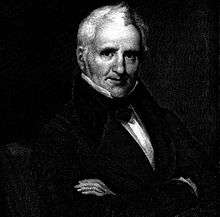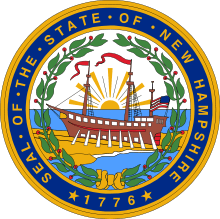Jeremiah Smith (lawyer)
| Jeremiah Smith | |
|---|---|
 | |
| Preceded by | John Langdon |
| 6th Governor of New Hampshire | |
|
In office June 8, 1809 – June 5, 1810 | |
| Succeeded by | John Langdon |
| Judge of the United States Circuit Court for the First Circuit | |
|
In office February 20, 1801 – July 1, 1802 | |
| Appointed by | John Adams |
| Preceded by | Seat established |
| Succeeded by | Seat abolished |
| Member of the U.S. House of Representatives from New Hampshire's At-large district | |
|
In office March 4, 1793 – July 26, 1797 | |
| Preceded by | Abiel Foster |
| Succeeded by | Peleg Sprague |
| Member of the New Hampshire House of Representatives | |
|
In office 1798–1799 | |
| Personal details | |
| Born |
November 29, 1759 Peterborough, New Hampshire, British America |
| Died |
September 21, 1842 (aged 82) Exeter, New Hampshire, U.S. |
| Political party | Federalist |
| Spouse(s) |
Elizabeth Ross Elizabeth Hale |
| Alma mater |
Harvard University Rutgers University, New Brunswick |
| Religion | Presbyterianism |
Jeremiah Smith (November 29, 1759 – September 21, 1842) was an American lawyer, jurist and politician from Exeter, New Hampshire.
Born in Peterborough, New Hampshire, Smith attended Harvard University before graduating from Queens College, New Brunswick (now Rutgers University) in 1780. He served in the Continental Army, and read law to enter the bar in 1786. He was in private practice in Peterborough from 1786 to 1796. He was a member, of the New Hampshire State Legislature from 1798 to 1799, and represented the state in the United States House of Representatives from 1791 to 1797. He was a United States Attorney for the District of New Hampshire from 1797 to 1800. He was a probate judge of Rockingham County, New Hampshire from 1800 to 1801.
On February 18, 1801, Smith was nominated by President John Adams to a new seat as a federal judge on the United States circuit court for the First Circuit, created by 2 Stat. 89. He was confirmed by the United States Senate on February 20, 1801, and received his commission the same day. Smith's federal judicial service was terminated on July 1, 1802, due to abolition of the court. He then became Chief Justice of the Supreme Judicial Court of New Hampshire, from 1802 to 1809.
Smith was elected Governor of New Hampshire in 1809, defeating incumbent Governor John Langdon by only 319 votes. However, Langdon defeated Smith in the following election, in 1810. Smith returned to the private practice of law from 1810 until 1813, when he again became Chief Justice of the Supreme Judicial Court of New Hampshire, this time until 1816, when he was removed by the elimination of the court by the legislature.[1] He again returned to private practice New Hampshire from 1816 to 1820.
Smith was elected a member of the American Antiquarian Society in 1814.[2]
Smith died in 1842 in Dover, New Hampshire, and is buried at the Winter Street Cemetery in Exeter.
References
- ↑ See John H. Morrison, Life of the Honorable Jeremiah Smith, Little & Brown, 1845.
- ↑ American Antiquarian Society Members Directory
External links
- Smith's Congressional biography
- Jeremiah Smith at the Biographical Directory of Federal Judges, a public domain publication of the Federal Judicial Center.

- Jeremiah Smith at National Governors Association
- Jeremiah Smith at Find a Grave
| United States House of Representatives | ||
|---|---|---|
| Preceded by Abiel Foster |
Member of the U.S. House of Representatives from New Hampshire's At-large congressional district 1793–1797 |
Succeeded by Peleg Sprague |
| Legal offices | ||
| Preceded by Edward Livermore |
United States Attorney for the District of New Hampshire 1797–1801 |
Succeeded by Edward Livermore |
| New seat | Judge of the United States Circuit Court for the First Circuit 1801–1802 |
Seat abolished |
| Political offices | ||
| Preceded by John Langdon |
Governor of New Hampshire 1809–1810 |
Succeeded by John Langdon |
